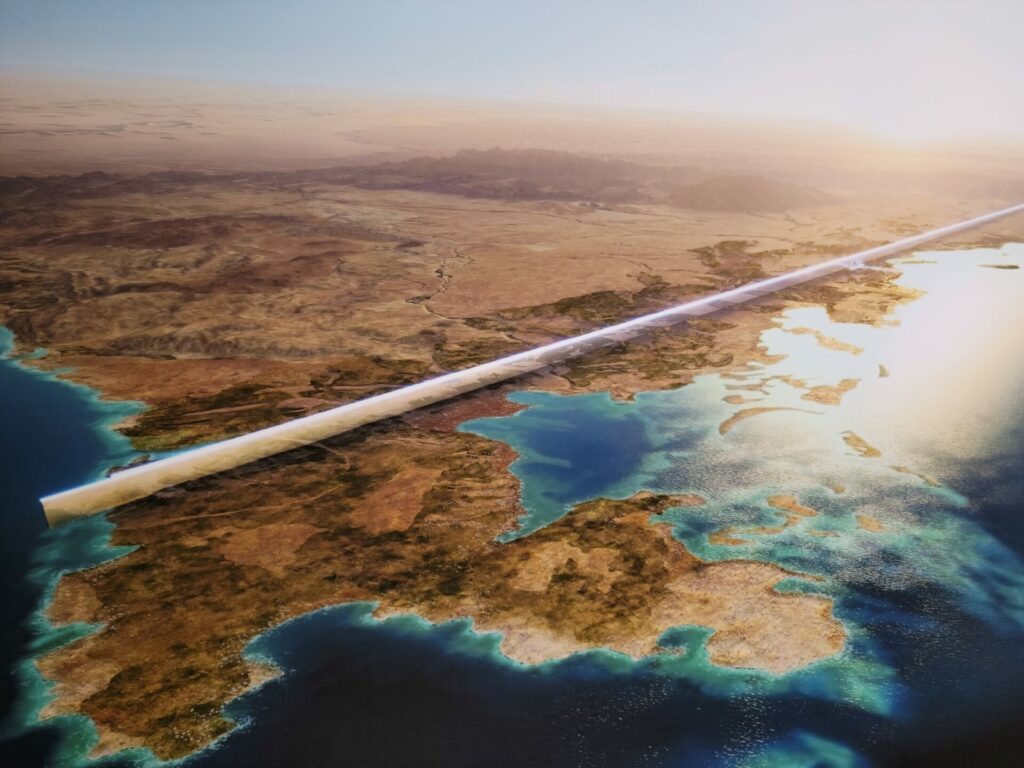The bright lights of an impressive cityscape sparkle against the night sky. I can smell the heady scent of perfume notes, along with the unmistakable aroma of coffee. Then I spot the white and gold domes of the Sheikh Zayed Grand Mosque.
This is Abu Dhabi, complete with its modern skylines, ancient traditions, and unique culture. Except I’m not in Abu Dhabi. I’m actually 7, 017 km away in London, experiencing what has been dubbed an ‘immersive Abu Dhabi experience’ the aim of which is to make me fall in love enough to book a trip immediately.
In some ways, it’s the stuff of sci-fi dreams – stepping into a room and suddenly being transported via virtual reality to wherever you want in the world. They did it in Star Trek via Holodecks and in the TV series of the same name or with transplanted memories of a great vacation in both versions of Total Recall.
The Dawn Of Virtual Reality Travel
With advances in AI and virtual reality seeming to leap forward every day, could we soon be seeing the dawn of ‘virtual’ travel, with no need to even leave our homes, let alone our countries, to explore the world?
And even if that’s a way off, is this the next chapter in the way we plan our holidays, with these virtual experiences enough to make us book a trip straight away? Could an immersive city ‘experience’ replace old-fashioned research and planning with its sense-driven sorcery courtesy of a combination of tech and in-person experiences?

The Abu Dhabi Experience feels like a start for both. Wraparound lights and sounds in the Outernet building in London’s Tottenham Court Road definitely ‘ignite the sense’ in the way they promise to. The sights come courtesy of high-definition videos and images plastered floor to ceiling all around me.
Of course, these ‘digital windows’ can’t go much further, and while the skylines are impressive and a video of waves lapping onto a glorious-looking beach is inviting, the latter is missing that sea breeze, and the warmth of the sun on my face.
With advances in AI and virtual reality seeming to leap forward every day, could we soon be seeing the dawn of ‘virtual’ travel, with no need to even leave our homes, let alone our countries, to explore the world?
Then again, it’s enough to draw people in to hang around for a second step that plays on more of the sense: timed workshops giving us the chance to make our own perfume, witness Bedouin weaving in action, or see the traditional Bait Al Gahwa coffee ceremony. They’re all tastes of what you could do if you actually got on a plane to the UAE, but without the guilt of contributing to global warming or having to offset the carbon footprint of the journey.
In another room, videos and images offer the ability to find out more about tourist hotspots along with (unsurprisingly) TripAdvisor reviews. There’s the gimmick of being able to swipe the screen and while it’s fun, it’s the same research you might do at home – just on a much bigger scale.
Immersive Destinations
That said, my immersive tour guide Calum McArthur says the experience, which showcases everything from theme parks to wildlife, and ‘hidden gems’ has proved a hit – attracting more than 20,000 people to the experience across the previous two days.
‘We’ve had people say Abu Dhabi has been on their wish list for a while so they’ve come here to find out some more,’ he says. ‘Others have popped in and are now going away more curious than ever about Abu Dhabi, so yes it seems to be piquing their curiosity. They can watch it, smell it and even taste it, which goes beyond what they could do at home.’

Abu Dhabi isn’t the only place to use VR to bring a destination to (virtual) life. Simon Heyes, founder of Senderos, which represents a collection of sustainable tourism experiences in Latin America, provided a VR headset to show off Brazilian conservation and community space, the Ibiti Project, at World Travel Market, recently held in London.
Headset Holidays
‘The Ibiti Project VR headset went down a storm at WTM,’ he said. ‘Everyone was bowled over by how transporting the experience really is. It takes you directly into rooms at the hotel and village and all around the breathtaking Ibiti nature reserve that’s full of mountains, waterfalls and rivers . There’s even an encounter with some rare northern muriqui spider monkeys.’
For Senderos, the use of VR is about trying to get people’s attention – basically ‘wowing’ them into wanting to get up and go somewhere, even if it is on the other side of the world. ‘VR is something different, it’s an immersive way of getting peoples’ attention, and showing folk Ibiti Project, wowing them, so that they want to go,’ Simon explains. ‘It’s also useful for updating people who have visited in the past about how much has been achieved, what’s new, to make them want to go again.’

It sounds – and looks – great but is it quite the same as being there? Breathing in the air? Tasting the food? Hearing the animals around you or touching your surroundings? Not quite, admits Senderos, especially with somewhere as unique as Ibiti.
‘The VR experience makes the idea of visiting Ibiti Project more tempting,’ he tells The Ethicalist. ‘It is never going to replace the experience of actually being there. Ibiti is a multifaceted product, it exists for a purpose – as a beacon of sustainable change – and isn’t not on the main tourist routes. At Senderos we really have to keep innovating to show just how amazing, different and enriching a place like Ibiti Project is and tempt tour operators to go there in order to get their clients to include it on their Brazil itinerary.’
‘There are no smells, no wind on your face, no food to taste or holiday romance. It can give you a sense of the place and the visual and auditory experience will likely get quite close until you move and you’re walking on carpet rather than the cobbles of St Mark’s Square’
According to Tripadvisor, travellers are increasingly interested in the use of Augmented Reality, Virtual Reality and AI when planning their trips. ‘The majority of Tripadvisor users are enthusiastic about the potential of emerging technologies to enhance their travel experience, with 43 per cent already embracing augmented and virtual reality for planning, and two in three open to the idea of virtual tours for destination previews,’ says Tripadvisor’s Global Vice President of Sales & Partnerships Christine Maguire. ‘From a destination perspective, 70 per cent of tourism boards believe AI has the most potential to improve the traveller experience over the next five years, with around one third also citing AR (31 per cent) and VR (29 per cent) as influential.
‘We know from our research that travellers are more curious than ever and want to get closer to a destination during the planning phase and this activation has made that possible. By bringing Tripadvisor’s authentic reviews to life and showcasing our community’s favourite hotels, restaurants and activities in an immersive way, we’ve been able to give people a real feel for Abu Dhabi to inspire their next trip.’
Immersive Experiences

So, it’s great for planning – but as things stand, perhaps we’re still a way off virtual travel, and while technology can give us a flavour of a place, it won’t be the same as being there in person. ‘In the foreseeable future, no virtual experience is going to match the real thing, or even come close,’ says futurist Tom Cheesewright. ‘No smells, no wind on your face, no food to taste or holiday romance. It can give you a sense of the place and the visual and auditory experience will likely get quite close until you move and you’re walking on carpet rather than the cobbles of St Mark’s Square.’
Does that mean we’ll never get there? Not necessarily, says Cheesewright, who admits that anything is possible. “At some point in the distant future, we might start to bypass our senses, or spoof them, and project experiences directly into our brains. At that point, anything is possible. Imagine ultra-vivid dreams that you can direct and remember. But we’re a long, long way from any such technology or even sufficient understanding of the brain to make it real right now.’
Until then, immersive experiences certainly might have their place, with technology making them more impressive than ever. And while virtual reality might not be able to take you across the world – one travel experience might be to beautify your current surroundings, Cheesewright predicts, allowing us to rewrite our current reality in the style of a foreign destination.
‘Imagine you’re walking down a boring suburban high street and you want something a bit prettier,’ he suggests. ‘A generative AI system could take a prompt to make Barking feel more like Barcelona, and redraw the architecture around you. The feeling under your shoes would still make sense, and the people and street furniture would all still be in the same places. But it would all be in Catalan style. That would be very cool.’
Indeed it would.









